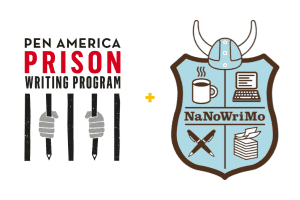Works of Justice is an online series that features content connected to the PEN America Prison and Justice Writing Program, reflecting on the relationship between writing and incarceration, and presenting challenging conversations about criminal justice in the United States.
This November, our Prison Writing Mentor Program is proud to partner with National Novel Writing Month (NaNoWriMo) to pilot a new project that moves the act of mentorship out of its one directional engagement (outside mentors, incarcerated mentees) to exist in multiple environments and forms.
National Novel Writing Month is a daunting but straightforward challenge: to write 50,000 words of a novel during the 30 days of November. Each year on November 1, hundreds of thousands of people around the world begin to write, determined to end the month with 50,000 words of a brand-new novel.
Using the NaNoWriMo organization’s time-tested structure and thorough workbook materials, we have invited five of our most skillful PEN America Prison Writing Award-winning writers to mentor a small group of self-identified writers in the prison where they live.
As part of our efforts to connect the writing community through the walls, we’re inviting you to share support and feedback with our incarcerated NaNoWriMo writers. Even better if you’re also undertaking the challenge!
Here is how you can engage:
- Meet our NaNoWriMo facilitators, and read about the projects they are taking up in November, below.
- We have forthcoming pep talks from accomplished writers that are written expressly for our writers on the inside, but—as you’ll see—will likely speak to you, too. They underscore that writing behind the walls is not so different from writing in the outside world. Scroll below to read the first pep talk in our series from fiction novelist Ryan Gattis!
- We’ll be sharing excerpts of works in progress and status updates from our inside writing groups on this blog over the course of November. To be updated when a new blog is posted, please sign up here: /* = 0;if(!is_postback){return;}var form_content = jQuery(this).contents().find(‘#gform_wrapper_95’);var is_confirmation = jQuery(this).contents().find(‘#gform_confirmation_wrapper_95’).length > 0;var is_redirect = contents.indexOf(‘gformRedirect(){‘) >= 0;var is_form = form_content.length > 0 && ! is_redirect && ! is_confirmation;var mt = parseInt(jQuery(‘html’).css(‘margin-top’), 10) + parseInt(jQuery(‘body’).css(‘margin-top’), 10) + 100;if(is_form){jQuery(‘#gform_wrapper_95’).html(form_content.html());if(form_content.hasClass(‘gform_validation_error’)){jQuery(‘#gform_wrapper_95’).addClass(‘gform_validation_error’);} else {jQuery(‘#gform_wrapper_95’).removeClass(‘gform_validation_error’);}setTimeout( function() { /* delay the scroll by 50 milliseconds to fix a bug in chrome */ jQuery(document).scrollTop(jQuery(‘#gform_wrapper_95’).offset().top – mt); }, 50 );if(window[‘gformInitDatepicker’]) {gformInitDatepicker();}if(window[‘gformInitPriceFields’]) {gformInitPriceFields();}var current_page = jQuery(‘#gform_source_page_number_95’).val();gformInitSpinner( 95, ‘https://pen.org/wp-content/plugins/gravityforms/images/spinner.svg’, true );jQuery(document).trigger(‘gform_page_loaded’, [95, current_page]);window[‘gf_submitting_95’] = false;}else if(!is_redirect){var confirmation_content = jQuery(this).contents().find(‘.GF_AJAX_POSTBACK’).html();if(!confirmation_content){confirmation_content = contents;}setTimeout(function(){jQuery(‘#gform_wrapper_95’).replaceWith(confirmation_content);jQuery(document).scrollTop(jQuery(‘#gf_95’).offset().top – mt);jQuery(document).trigger(‘gform_confirmation_loaded’, [95]);window[‘gf_submitting_95’] = false;wp.a11y.speak(jQuery(‘#gform_confirmation_message_95’).text());}, 50);}else{jQuery(‘#gform_95’).append(contents);if(window[‘gformRedirect’]) {gformRedirect();}}jQuery(document).trigger(‘gform_post_render’, [95, current_page]);gform.utils.trigger({ event: ‘gform/postRender’, native: false, data: { formId: 95, currentPage: current_page } });} );} ); /* ]]> */
- Many writers participating in the challenge in the free world talk and connect via social media. As there is no Internet in prison, we have to get a bit creative. We invite you, and all your writing friends, to share messages of encouragement, camaraderie, excerpts of works-in-progress, and other notes that help link the NaNoWriMo outside the walls to the NaNoWriMo on the inside. Please use the form below.
Meet Our PEN America + NaNoWriMo Facilitators
Matthew Mendoza has published fiction, non-fiction and poetry—all from prison. He has won awards from American Short Fiction and PEN. His play, “Freedom Feather,” was performed at the 2018 Brooklyn Book Festival. He was told that he was a Poetry Project Featured Reader. He juries prison writing for the Evening Street Review website.
And just between us: I am deathly afraid of needles. I’m convinced that my favorite writer’s name is pronounced Pine-Cone. I feel a preternatural communion with Edward Hopper’s work. I want to tickle Jennifer Lawrence until she pees. I think Helen Phillips should have a calendar. NaNoWriMo scares the shit out of me.
My name is David A. Pickett, and I am pleased to be doing what I can to facilitate a NaNoWriMo group here at MCF-Lino Lakes. I have been writing, off and on, some 40 years, mostly poetry, with occasional forays into fiction and nonfiction. I have won prizes in the PEN America Prison Writing contest—for both fiction and poetry—and have work forthcoming in Poetry magazine. My one previous attempt at NanoWriMo, a dozen or so years ago, ended about 35,000 words early; I hope to do better this time.
Project: I’m going to be writing a novel, a bildungsroman, about a boy seeking the meaning of life, at least the meaning of his life, as he grows up through the course of his travels in the Western United States.
The primary helpful technique I have to share, I guess, is the importance of concentrating on the “shitty first draft” (courtesy Anne Lamott, of course, from Bird by Bird). In other words, silencing the inner editor.
I said yes to the experience because, well, why not? As for deciding who to ask to join, I just put the proposal before my regular monthly writer’s collective meeting. I’m looking forward to completing the challenge myself, and—I hope—helping my fellow writers to do so themselves.
Thanks again for the support. I’ll do what I can on this side of the fence!
Derek Trumbo Sr. has spent 10 years writing 10-minute plays as a member of the Voices Inside Playwrights Circle, where he was taught to use writing to rehumanize himself. If harsh words, angry shouts, and dangerous thoughts could shape broken people, then surely those same words, shouts, and thoughts could be used to build resolve, strengthen potential, and empower those who were broken by them.
Project: The Bus Rider(s) is a literary thriller. Fr. Marc Union is a priest with a death wish who must use his profession to protect the lives of his fellow bus riders when a school shooting plot turns into a hostage situation on public transit.
When asked to facilitate, Derek shared it with his fellow writers and immediately had volunteers. In prison, opportunities are rarely given and must be seized. All members share the same dorm and support one another. The group is: Derek Trumbo Sr., William Daniels, Andrew Phillips, John Mudd, and Matthew Tipton.
William Myrl Smitherman is an incarcerated writer. He dropped out of high school at 17, was arrested two years later in 2009, and has been in prison ever since. At 23, he was diagnosed with bipolar disorder, and treatment changed his life. Where before he wrote because he had to, he now writes because he wants to, and that’s nice. PEN has been gracious enough to extend him awards in their Prison Writing Program from 2016-2019, and he had an essay published in REED magazine. His novel Dragon’s Summer was said by him to be “one of the best books I have ever written.”
His family is deeply supportive and he doesn’t deserve them.
Project: My project for this November is called Dreaming in the Dark, about a group of children trapped on an automated space station. It is an intrapersonal exploration in the trappings of sci-fi and horror.
Our group meets before a free college class we all happen to be taking on Tuesdays. I extended an invitation to everyone I know who wants to write a novel, but the majority were intimidated by the NaWriNoMo challenge. I hope we can encourage each other to keep writing, because that’s what matters most at this stage.
Read our peer facilitator’s week 2 update!
Pep talk from Ryan Gattis:
Dear Writer,
Let me tell you plainly: there was a time when I wrote stories just to see if I was capable of it. Because where I grew up, nobody was a novelist. I mean, nobody was paid to make up long stories and string sentences together. It just wasn’t a life to be had.
So, when it came time for me to try to write a novel, something of any length and consequence, I didn’t so much write it, as struggle through a series of chapters just to get to the end.
Only then could I look back at it, to see if it was real.
To see if I was different at the end. If I was capable of something more.
And now I’m on the other side of that, I can say this…
Writing to the end changes you. But it doesn’t make you different.
I was still the same human.
I just hadn’t figured out yet that I needed to write with a problem in mind, every chapter. A problem that needs solving. Even if it’s as simple as being hungry. Even if your character doesn’t manage to eat. Even if it’s one step forward, two steps back.
Focus on the characters’ problems and how to solve them, page by page. Not the perfect words. Because perfect words don’t exist.
Only words that feel true.
And editing doesn’t belong in the present. Not while you’re composing.
When you write that fresh first draft, you need to write for you.
Trust your eyes, your ears, your gut. Trust what you think is right. Trust what you know would captivate an audience if you were telling a story aloud.
Hit beats on the page, as you would orally, while regaling friends—or, even better—enemies. The way you say those things is your voice. And your voice is valuable. Trust it.
And when you’re not writing, when you’re having to live your life around those times with pen in hand, take it in. Feel it.
And listen to yourself as life’s happening. Catalog the good, undeniable details of it. Mark the aspects of sadness, too.
Always ask yourself: when you get stuck holding all rind and no fruit, how does it feel? How would I describe this, to someone not from here? How can I put a stranger in these shoes?
Because the only way to turn bad things into art is to listen. Not just with your ears.
Listen with your eyes, too. See small plots rippling through actions. See the slow marching of cause and effect. And look through them, into whys. Into what propels them in the first place.
Because that seeing—how you see something, how you interpret it—is part of your purpose.
It’s what sets you apart as a storyteller.
Your eyes are yours alone. Your experience? Yours alone. No other human being in the history of the planet has ever lived your exact life, moment by moment.
And you are all the more valuable for it. The definition of unique.
Which is precisely why you have got to write with purpose.
Put your whole heart in, even when the page just asks for half. Or a quarter. Or your heart’s just begging you to hide it from a reader, so as not to be seen at all.
Because great writing—true writing—doesn’t happen when we want others to read our work and think we’re cool, or smart, or interesting. Great writing happens when we excavate that which makes us most human. Flaws. Bad decisions. Mistakes and regrets.
And always—always—a wish to be better tomorrow regardless of what has occurred.
Writing good prose means listening to your fellow humans and not correcting their errors in grammar or judgment, but valuing them as true. In that moment.
Writing prose that sounds like it’s spoken by real people from real places is like fighting the incoming tide while swimming out to sea.
And if you pick that path, you will flag. Your arms and wrists will eventually give up on you. Especially as you strain for the right words. The right rhythm.
But be aware that your craft is forged in this straining, in this reaching out. And during the worst of it, every stretch will make you stronger tomorrow, even if you can’t see it today.
So, believe this: there will come a time when writing for yourself is not enough to sustain you.
You must write for what you love. You must write for friends and family long gone. You must write for what you wish to become.
You must write for what you love, even if you have to dig to find it.
Because writing about what you hate is not enough. It never is.
Hate, by nature, is a sprint. Every time, it will gas you. It will leave you empty.
Write for love. That’s marathon fuel.
Write for what you cannot explain, because fiction is for grasping. For finding. For figuring out how you feel.
Fiction is for surprising yourself. Fiction is for looking back—with clarity.
Write from what life gave you.
Your joys and pains and everything in between? They’re a well inside you.
The emotions contained therein, beneath the surface, can push you if you’re brave enough to bring them up. And if you can harness them? If you can say something from that well in a new context, and bring something true for you out into a story?
That is art. That’s what travels. That’s what hits your readers and sticks.
And if your words to describe such things are the same as what you’d fight to say in a dangerous moment, or a quiet moment, or an awkward moment, then they are true and right.
Trust them.
Your words—if you fight for them, if they scare you—are true and right.
Your words—if they open you up wide, if you think they’ll scare others—are true and right.
If you can’t trust yourself, trust that.
And keep chasing it.
You’ll get there. And when you do, you start again.
Wiser. Bolder. Smarter.
 Ryan Gattis is the author of Safe, Kung Fu High School, and All Involved: A Novel of the 1992 L.A. Riots, which won the American Library Association’s Alex Award and the Lire Award for Noir of the Year in France. He lives and writes in Los Angeles, where he is a member of street art crew UGLARworks, and a founding board member of 1888, a Southern California literary arts non-profit.
Ryan Gattis is the author of Safe, Kung Fu High School, and All Involved: A Novel of the 1992 L.A. Riots, which won the American Library Association’s Alex Award and the Lire Award for Noir of the Year in France. He lives and writes in Los Angeles, where he is a member of street art crew UGLARworks, and a founding board member of 1888, a Southern California literary arts non-profit.

